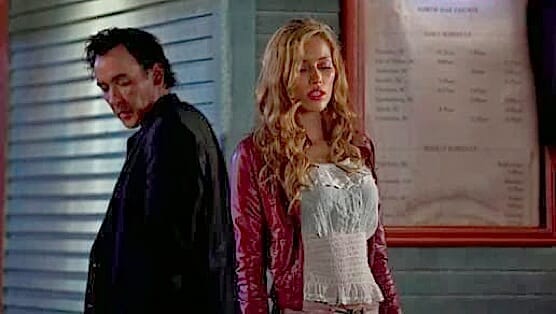
This film, a debut feature for co-writer/director David Grovic, is about a man who is hired to retrieve a bag and then wait in a motel room until his employer gives him further instructions. The project’s original title was Motel; its current title is The Bag Man. That should give you an accurate idea of the kind of narrative creativity on display in Grovic’s film, which, though intermittently weird enough to sustain a practically accidental sense of intrigue, remains a nonsensical endeavor, with a lackadaisical script that would hardly merit a passing grade in an intro-level screenwriting seminar, let alone theatrical-release exposure with performances from the likes of Robert De Niro and John Cusack.
Grovic begins the film with a startling lack of context: the opening scene, a pre-title-card conversation between crime kingpin Dragna (De Niro) and career criminal Jack (Cusack), introduces the central operation without anything resembling a backstory. From there, it’s off to the races. The scene takes place in an airplane, and the awkward mechanics of the interaction—Dragna using pieces of his rare-steak meal to explain a job that is mind-numbingly simple—foreshadows the rest of the movie’s illogical human behavior and imprecise filmmaking. The scene does, however, introduce a De Niro performance that achieves some bottom-barrel level of entertainment, which makes the film’s largely De Niro-free mid-section a tougher sit than it ought to be.
Jack proves to be a competent, instructions-following criminal: he gains possession of the bag without opening it, takes it to the motel that Dragna requested, and, again at the behest of his boss, explicitly asks to be situated in Room 13. Crispin Glover, in a baffling turn as the dazed-and-confused desk clerk, provides a suitably eerie retort to Jack’s room-number request: “Not many people ask for Room 13.” Glover then notices the blood dripping down Jack’s hand (Jack has just killed an associate of Dragna’s in self-defense), which prompts Jack’s problematic cover story: he tells the motel clerk that his wife has just stabbed him, and that he’s now seeking a room in the motel in order to let things cool down. The intensity of this cover story runs through the film like a running joke, thrusting Jack into heated conversations in which he has to play the role of the “stabbed husband.” It’s also indicative of the shortcomings of the film’s writing: if we’re meant to take Jack as a generally intelligent and capable person, why should we believe that he’d come up with such a dim-witted story?
Grovic fills The Bag Man with a cast of supporting characters that embody Lynchian degrees of abnormality: a patch-wearing brute named Lizard (Sticky Fingaz) who fantasizes about deflowering Eve in front of Adam; an aggressive dwarf (Martin Klebba) who wears blue sweats and gold chains; and a six-foot-tall ex-stripper named Rivka (Rebecca Da Costa), first seen in an outfit that features red heels, a gold skirt, and a blue wig. Da Costa, a Brazilian model-turned-actress, plays Rivka with an abundance of bewildering rhythms: she doesn’t read her lines so much as pause, hesitate, and whisper her way through them. To see an actor of Cusack’s caliber attempting to engage with such a relatively inexperienced performer is wacky at best, uncomfortable and alienating at worst. (Da Costa shouldn’t get all the blame, however: it’s got to be hard for any actress to deliver a line like “I love Israel” with conviction.)
Stylistically, the film’s foremost qualities are its occasionally inspired production design (for a seedy, rundown motel, there’s a lot of mahogany) and its inclination for garish beams of light: Grovic illuminates the hotel with rays of blue, green, red and purple, which ultimately proves more distracting than anything else. What’s most peculiar about the film is that, as the movie keeps delaying narrative satisfaction—as it keeps De Niro off-screen, and narrative information at bay—it acquires something of a theatrical tenor. Most of the material consists of Jack sitting in a motel room with someone else (Rivka, mostly), speculating about what’s going to happen. In effect, this uncertainty becomes the movie’s driving force, as we don’t know anything more about Dragna than Jack does. For this approach to work, however, Grovic would’ve needed to provide more formal ingenuity, better-functioning dialogue, and just a clearer overall indication that he had a sincere interest in actually working through these themes. As it stands, The Bag Man’s 108-minute runtime feels as if it contains no more than 30 minutes of legitimate, active narrative material.
Even more problematic than this, however, is the debasing violence and misogyny of the film. By my count, there are two female speaking roles in the film (Celesta Hodge plays the second one), and both women end up getting beaten by men at various points in the film. This is to say nothing of the many samples of insulting dialogue. In one scene, De Niro states that “All women are whores”; in another, a vicious cop (Dominic Purcell) shares his own brand of wisdom: “Coke whores will hide it just about anywhere!” These scenes are surrounded by other gratuitously unpleasant sights and sounds: Klebba pissing on Cusack, Cusack scraping an assailant’s skull against highway pavement. Grovic doesn’t address his ideas and tactics with enough seriousness to justify sitting through such visceral affronts.
Director: David Grovic
Writer: David Grovic, Paul Conway
Starring: John Cusack, Rebecca Da Costa, Robert De Niro, Crispin Glover
Release Date: Feb. 28, 2014